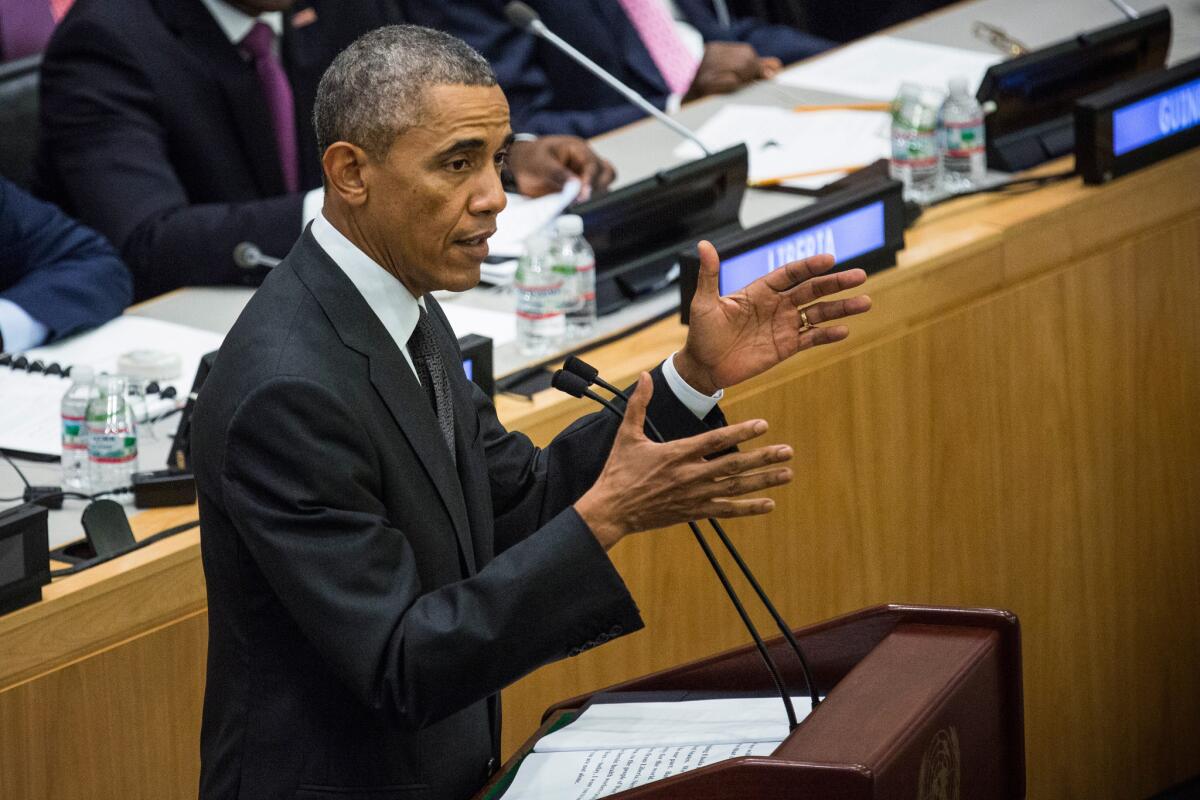Obama, at U.N., calls Ebola a threat to global security

- Share via
Reporting from the United Nations — President Obama and other leaders delivered a sobering message at the United Nations on Thursday, saying the world was not doing enough to contain the Ebola outbreak in West Africa and avert a “humanitarian catastrophe.”
“This is more than a health crisis,” Obama told leaders at a special gathering convened while the U.N. General Assembly was meeting in New York. “This is a growing threat to regional and global security.”
Faced with a caseload that is doubling every three weeks, U.N. Secretary-General Ban Ki-moon has called for a “twentyfold surge in care, tracking, transport and equipment” to get in front of the epidemic, which is believed to have killed more than 2,900 people.
Obama said last week that he would send as many as 3,000 military personnel to establish a coordination center in Liberia and work with partners to set up Ebola treatment facilities, train health workers and distribute medical supplies and prevention information.
Britain, France, Cuba, China and others have also announced significant contributions to the effort. But U.N. and humanitarian officials say the response has until now fallen critically short.
“This is a fast-moving epidemic that got ahead of everyone at the start and is still running ahead, jumping over everything we put in place to try to slow it down,” said Dr. Margaret Chan, head of the World Health Organization.
Hundreds of millions of dollars in additional help were pledged during the two-hour meeting, by organizations such as the World Bank and European Commission and U.N. member states big and small.
Leaders of the countries affected by Ebola and representatives of some of the aid groups working to contain the epidemic welcomed the announcements, but they said they would mean little unless the donors quickly made good on their pledges.
“The reality on the ground today is this: The promised surge has not yet been delivered,” said Dr. Joanne Liu, international president of the charity group Doctors Without Borders. “The sick are desperate, their families and caregivers are angry, and aid workers are exhausted.... Today, Ebola is winning.”
The sick continue to be turned away from Ebola care facilities because there aren’t enough beds, returning home to spread the virus further, she told world leaders.
“Our 150-bed facility in [the Liberian capital] Monrovia opens for just 30 minutes in the morning,” she said. “Only a few people are admitted — to fill beds made empty by those who died overnight.”
It is the largest such outbreak the world has seen, with more than 6,200 suspected or confirmed cases in five countries reported to the WHO since March. In the hardest-hit nations — Guinea, Liberia and Sierra Leone — health systems are buckling under the strain.
At least 373 healthcare providers have contracted Ebola and 208 have died of the virus, which is spread through contact with bodily fluids. Many of their colleagues are now too afraid to work. Patients, too, are staying away. More people are dying in Liberia of common and treatable ailments than of Ebola, Ban said last week.
The World Bank has warned of a “potentially catastrophic blow” to the economies of the most affected countries. Trade, transport and other services have been disrupted. Food prices are rising. In Lofa County, once Liberia’s breadbasket, fields are lying fallow. Nearly 170 farmers and their family members have died of Ebola in that county alone, according to the WHO.
Fear and confusion about the virus have led to outbreaks of violence. Last week, eight members of a delegation sent to a remote village in Guinea to educate people about Ebola were attacked and killed, their bodies thrown into latrines.
Sierra Leone’s president, Ernest Bai Koroma, called Ebola “a disease worse than terrorism” and said the affected countries would need the “heavy aerial and ground support of the world” to defeat it. He announced Wednesday that he was sealing off three districts that are home to more than 1 million people. About a third of the country’s 6 million people are now under quarantine.
Last week, the U.N. Security Council declared the Ebola crisis a threat to international peace and security, unanimously passing a resolution that calls on member states to urgently send medical personnel, supplies and logistical help to fight the outbreak. An emergency mission is being set up to coordinate the response.
Ban urged leaders at Thursday’s meeting to consider whether the world needs a standby corps of medical professionals, saying the Ebola crisis has highlighted the need to strengthen early identification systems and early action.
“Just as our troops in blue helmets help keep people safe, a corps in white coats could help keep people healthy,” he said.
Speaking to an organization not known for rapid action, Obama warned against following the deliberative pace and political jockeying that typically come with a broad international effort.
“Everybody’s got to move fast,” Obama said. “Do not stand by thinking that somehow because of what we’ve done that it’s taken care of. It’s not.”
Hennessey reported from the United Nations and Zavis from Los Angeles.
For more international news, follow @khennessey and @alexzavis on Twitter
More to Read
Sign up for Essential California
The most important California stories and recommendations in your inbox every morning.
You may occasionally receive promotional content from the Los Angeles Times.












